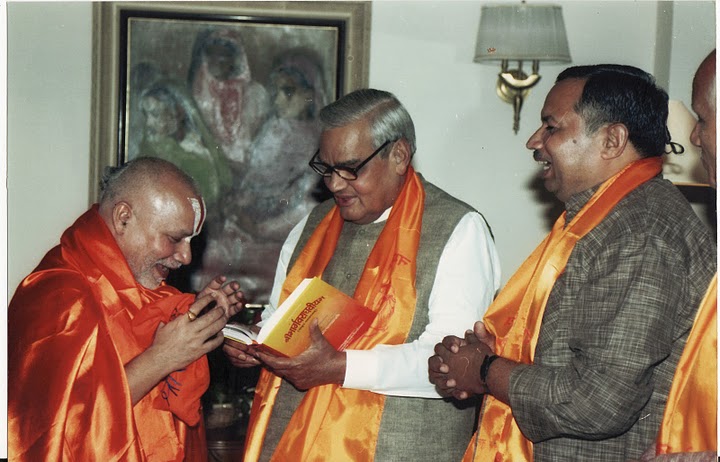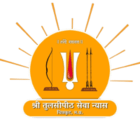श्रीभार्गवराघवीयम्
Śrībhārgavarāghavīyam is a Mahākāvya (epic poem) in Saṃskṛta which was composed by Gurudeva during his sixth six-month Payovrata (diet of only milk and fruits) at Chitrakoot. The epic was published in 2002, along with the Kṛpā commentary in Hindi by Gurudeva, by the Jagadguru Rambhadracharya Handicapped University. The book was released by the illustrious Prime Minister of India, Pandit Atal Behari Vajpayee, at his 7 Racecourse Road residence in New Delhi on October 30, 2002. The epic poem has been widely acclaimed by the fraternity of Saṃskṛta scholars. In addition to numerous other awards, the epic was awarded the twelfth Śrīvāṇī Alaṅkaraṇa Puraskāra (2005, Ramkrishna Jaydayal Dalmiya Foundation), the thirty-eighth Sahitya Akademi Award in Sanskrit (2005, Sahitya Akademi), the Bāṇabhaṭṭa Award (2006, Madhya Pradesh Sanskrit Board) and the sixteenth Vācaspati Puraskāra (2007, K. K. Birla Foundation). Śrībhārgavarāghavīyam consists of 2,121 verses in 40 Saṃskṛta and Prakṛta metres, and is divided into 21 cantos (Sargas) of 101 verses each. The epic presents the narrative of Lord Paraśurāma and Lord Rāma drawing from several sources including Vālmīkīya Rāmāyaṇa, Śrīmadbhāgavatam, Brahmavaivartapurāṇa, Prasannarāghavam, Satyopākhyāna and the Śrīrāmacaritamānasa. The incarnation of Lord Paraśurāma, his learning from his Guru Lord Śiva on Kailāsa, his execution of Jamadagni's command to behead Reṇukā and her subsequent resurrection, his slaying of Sahasrārjuna and the annihilation of Kṣatriyas 21 times from the earth, and his battle with Lord Gaṇeśa form the first nine cantos. The next five cantos cover the incarnations of Lord Rāma and mother Sītā. The last seven cantos describe Viśvāmitra's journey to Ayodhyā, the slaying of the demons by Lord Rāma and Lakṣmaṇa, the redemption of Ahalyā, the meeting of Lord Rāma and mother Sītā in Janaka’s garden, the breaking of Śiva bow by Lord Rāma, the confrontation between Lord Paraśurāma and Lord Rāma, the surrender by Lord Paraśurāma to Lord Rāma and the marriage rites of the four sons of Daśaratha in Mithilā. The first Saṃskṛta-only digital edition of Śrībhārgavarāghavīyam was published in 2009 by the Shri Tulsi Peeth Seva Nyas. The second digital edition was published in February 2013. Changes from the first edition include typesetting with Sanskrit 2003 font, inclusion of the Introduction (Nāndīvāk) by Triveṇīkavi Abhirāja Rājendra Miśra, the Foreword (Purovāk) by Gurudeva, the Review (Samīkṣā) by Devarṣi Kalānāthaśāstrī, and the commentaries of the single-consonant verses (Ekākṣariślokas) in the twentieth canto. Along with a PDF release, the epic is now also available for reading online. Download Śrībhārgavarāghavīyam PDF(187 pages, 1.7 MB)॥ सर्वत्राप्यकुण्ठा गतिर्भार्गवराघवीयकाराणाम् ॥The movement (reach) of the creator of Bhārgavarāghavīyam is uninhibited everywhere - Abhirāja Rājendra Miśra

माघे किराते ननु नैषधीये रघौ कुमारेऽपि च ये विशेषाः।
तेभ्योऽधिका जाग्रति रामभद्राचार्योद्भवे भार्गवराघवीये॥Verily, whatever are the special qualities in the work of Māgha (Śiśupālavadham), in the Kirātā work (Kirātārjunīyam), in the Naiṣadhīya (Naiṣadhīyacaritam), in the Raghu work (Raghuvaṃśam) and in the Kumāra work (Kumārasambhavam), even more than those arise in the Bhārgavarāghavīya work by Jagadguru Rāmabhadrācārya. - Professor Yogeshchandra Dubey
